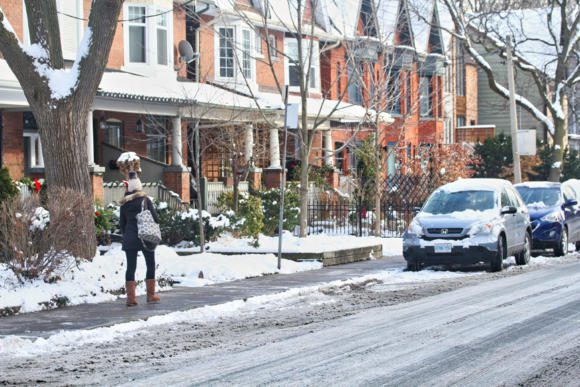Buying & Selling During the Winter in Toronto

When spring arrives in Toronto, so too do the for-sale signs on front lawns.
That’s the Toronto real estate market for you. Despite the fact that as Canadians we should feel comfortable doing just about anything in the dead of winter, there’s something about home sales in the snow that seem to turn off buyers and sellers. However, you’re actually being a little short-sighted if you believe this.
Spring is great if you want to fight with more competition, but if you want to be a little more seller savvy, the winter is the time to hit those buyers when inventories are low. As a buyer, you’ll also face less competition and avoid those nasty, tiresome bidding wars that can interfere with getting your dream home. Here are some advantages to the Toronto housing market in the dead of winter whether you are buying or selling.
The Inventory
Seller: We’re leading with this because the winter months will definitely see a reduction in the number of homes available for sale in Toronto. As a seller, this is awesome news because for the buyers out there suddenly even a ho-hum home starts to look pretty good. You’ll be less worried about presenting your home to keep up with the Jones down the street and reap the benefits of having the best house in the area. This could get you a better price thanks to the laws of supply and demand, but really only if you’re in a highly desirable area. Otherwise, you might get some low-ball offers since there will be fewer buyers and those putting in an offer know it.
Buyer: Home buyers will be faced with the very challenge we mention above. You will have fewer homes to choose from which means you might not find exactly what you want. However, it’s never a good time to ensure you will find the exact house you want. This tends to be a pretty tall order. As well, you might find some sellers are looking for more money if they’re not desperate to sell but instead are taking advantage of the inventory angle. Of course, you can also be in the driver’s seat if they aren’t getting as many offers as they hoped.
No Bidding Wars
Seller: While in the summer there are plenty of buyers chomping at the bit to buy your home, you’ll not likely see that in the winter. That means you could miss out on a bidding war that can really bump up your price. However, again if you are in a highly desirable area the shortage of inventory in Toronto real estate at this time of year could still work in your favour if you happen to attract desperate buyers who are having trouble finding something in the winter.
Buyer: While there are fewer homes on the market, there are also fewer buyers. This reduces your competition and helps you avoid the dreaded bidding war scenario and exorbitant home prices. As one of the few willing to brave the cold and consider buying a home when the rest of the city has visions of sugar plums dancing in their heads, you will be a sought-after commodity in a frigid and unwelcoming environment.
Leverage the Season
Seller: The holidays trigger strong emotions that can work in your favour when selling in the winter. You can get your home all spiffed up in your holiday finery and pull on some heartstrings to get a sale. At the same time, this could backfire on you in a city as diverse as Toronto. You might narrow down your buyer appeal when people of other cultures visit your home.
Buyer: The season might not affect you much one way or the other. You should, however, be cautious if you do visit a home decked out for the holidays, and you celebrate Christmas because it could persuade you to make a decision that is more emotional than logical. And remember, what better way to hide imperfections than Christmas décor?
Winter Readiness
Seller: You can turn up the fire or jack up the heat, so buyers see your home is cozy and winter-ready. However, you also want to avoid people noticing things like how long your driveway is and how much snow shoveling that will entail. Avoid massive snow piles on your property and keep things looking as low maintenance as possible. This includes knocking the icicles off the eavestroughs to keep people focused on the positives of the home.
Buyers: There’s much to be said about learning first-hand whether or not the heat in the home works. You can also get a look at the fireplace to see if it is fully functional. Take note of how much winter maintenance is required on the property when heavy snowfalls hit.
Motivated
Sellers: Because of low inventory and the time of year, you might find more buyers are motivated to put in an offer. They will be having trouble finding homes to view, so yours will become far more appealing. As well, people looking at homes in the dead of winter tend to be more serious. While a bored person might think it would be fun to go “window shopping” for a house in the summer, most will not put on their coat and boots to schlep around viewing homes they don’t intend to buy in the winter.
Buyers: Sellers who put their homes on the market tend to be more motivated to sell. They need to make a move for some reason or other and you can take advantage of that motivation, often with terms in your favour, not to mention a lower offer.
Seasonal Bonuses
Sellers: Many buyers might be happy to make a more generous offer or put down more cash upfront because they are expecting some cash in way of bonuses or even an income tax return.
Buyers: First-time buyers can be primed to take advantage of incoming windfalls like Christmas bonuses or income tax returns to put down more when you buy in the winter. By the time summer rolls around you know that money will be spent.
Overall, there is much to be said about buying or selling a home in the winter housing market. Other than sellers having to worry about wet boots trudging through their homes. Buyers having to do the trudging, it could be the very best time for a real estate transaction. Winter in Toronto – buying and selling.
Have questions? Contact Us.


